Secure your property investment with expert property registration services by KHA Advocates. We ensure smooth, lawful registration, document verification, and title clearance for NRIs and residents across Kolkata. Trust us for seamless, hassle-free transactions.

At KHA Advocates, we offer comprehensive property registration services in Kolkata, specializing in sale deed drafting, property title verification, and seamless registration with the Sub-Registrar Office. Our expert team ensures 100% legal compliance for all real estate transactions, making us the preferred choice for Indians, NRIs, First-Time Property Buyers, and property investors.
We provide end-to-end solutions that protect your property rights and ensure smooth ownership transfer. From document preparation to sale deed registration and title clearance, we guide you through each step with transparent, reliable, and efficient legal support.
Whether you’re purchasing residential or commercial property, KHA Advocates helps you navigate the complexities of property registration, offering hassle-free services with guaranteed legal protection. Protect your real estate investment with our expert legal services in Kolkata today.
A Sale Deed is a legally binding document that transfers ownership of property from seller to buyer. At KHA Advocates, we ensure accurate Sale Deed drafting, verification, and registration, protecting your real estate investments with complete legal compliance.
A Gift Deed is a legal document used to voluntarily transfer ownership of movable or immovable property without consideration. KHA Advocates offers expert drafting and registration services for Gift Deeds in Kolkata, ensuring lawful, hassle-free property transfers with full legal protection.
A Lease Deed is a legal agreement that defines the terms of renting property between a landlord and tenant. KHA Advocates provides professional drafting and registration services for Lease Deeds in Kolkata, ensuring secure, transparent, and enforceable rental transactions for both parties.
A Development Agreement is a legal contract between a landowner and a developer outlining terms for real estate development. KHA Advocates offers expert drafting and review of Development Agreements in Kolkata, ensuring clarity, protection of rights, and smooth project execution.
A Power of Attorney (POA) is a legal document authorizing one person to act on another’s behalf in property, financial, or legal matters. KHA Advocates specializes in drafting and registering POA documents in Kolkata, ensuring full legal validity and client protection.
A Partition Deed is a legal document used to divide jointly-owned property among co-owners, ensuring clear and undisputed ownership. KHA Advocates offers expert drafting and registration of Partition Deeds in Kolkata, protecting clients’ rights through transparent and legally compliant property division.
A Will is a legal document that outlines how a person’s assets and property should be distributed after their death. It ensures that your wishes are honored and minimizes family disputes. Consult KHA Advocates for expert Will drafting and estate planning services to secure your legacy.
A Hiba Nama is a legal document under Islamic law used to gift property or assets during the lifetime of the donor. KHA Advocates provides expert drafting and registration of Hiba Nama in Kolkata, ensuring compliance with Islamic inheritance laws and complete legal protection.
Navigate the complexities of property title searching with ease through our comprehensive step-by-step guide. From consultation to search report, streamline your property transactions efficiently.
Expert consultation to gather all details and understand your property problem fully.
Efficient submission process for legal documents, ensuring thorough search and identification of relevant information.
Detailed inspection to assist in drafting necessary legal documents and deeds for property transactions.
A detailed report summarizing key findings from property searches, aiding in informed decisions.
A detailed report summarizing key findings from property searches, aiding in informed decisions.
A detailed report summarizing key findings from property searches, aiding in informed decisions.

Our experienced property lawyers provide end-to-end legal assistance in property registration, ensuring a smooth and hassle-free process.

First-time buyers are at high risk of fraud. We help in detecting forged documents, disputed ownership, and unauthorized sales.

We handle all interactions with Sub-Registrar Offices, Revenue Departments, and other authorities, ensuring quick and lawful registration.

If the property has any pending disputes, encumbrances, or third-party claims, we provide expert legal assistance to resolve them.

Our client-centric approach ensures honest advice, timely execution, and complete transparency throughout the process.
A sale deed is a legal document that transfers ownership of a property from the seller to the buyer. It is crucial for registration and establishing legal ownership.
Need a sale deed drafted? KHA Advocates is here to help!
A lawyer helps with document verification, drafting sale deeds, title checks, and ensuring legal compliance in the registration process.
Book a consultation with KHA Advocates to secure legal guidance on your property registration.
Yes, NRIs can register property in Kolkata, provided they meet legal requirements and submit the necessary documents.
KHA Advocates provides expert services for NRIs looking to register property in India.
Stamp duty in Kolkata varies based on the property’s value and location but generally ranges between 5-7%.
Let us guide you on stamp duty and registration fees. Contact KHA Advocates.
You can check the registration status through the official land records or with the help of a lawyer.
KHA Advocates can assist in verifying your property’s legal status.
Yes, property registration can be done online through the official state government portals, but it requires legal assistance for document preparation.
KHA Advocates offers hassle-free online property registration services. Contact us today!
The process includes document preparation, stamp duty payment, sale deed signing, and submission to the Sub-Registrar Office.
Simplify the property registration process with expert legal help from KHA Advocates.
Yes, property registration is mandatory for transferring legal ownership of the property.
Ensure smooth and legal property registration with KHA Advocates.
No, an unregistered property transfer is not legally valid. Registration is required for the transfer to be official.
Contact KHA Advocates for assistance in completing your property registration.
A sale deed involves the transfer of property for consideration, while a gift deed transfers property without payment.
Need a sale deed or gift deed drafted? KHA Advocates is here to help!
Title verification involves checking the history of the property’s ownership and ensuring there are no legal disputes or encumbrances.
Let KHA Advocates conduct thorough title verification for your property.
No, the seller must clear all dues before the property can be registered.
KHA Advocates ensures that your property purchase is free from any encumbrances.
A power of attorney allows someone to act on your behalf for property transactions. It can be used when the property owner is unavailable.
KHA Advocates can draft a power of attorney for your property-related transactions.
The Sub-Registrar verifies and records the property documents, ensuring legal ownership transfer and compliance with registration laws.
Trust KHA Advocates to handle all aspects of your property registration process.
No, the original title deed is necessary for property registration. However, certified copies can be used in certain cases.
Let KHA Advocates guide you through document requirements and registration procedures.
The registration fee is generally 1% of the property value, subject to a minimum fee.
Reach out to KHA Advocates for transparent, professional property registration services.
The NRI sale deed registration process is similar to domestic registration, but NRIs may need to appoint a legal representative in India.
KHA Advocates specializes in property registration for NRIs. Contact us for expert assistance.
To change a name on a property title, you must provide legal proof, such as a marriage certificate or affidavit.
Let KHA Advocates help you with property title changes. Get in touch now!
Property registration taxes include stamp duty, registration fee, and potential capital gains tax. Consult a lawyer for detailed advice.
KHA Advocates can help you navigate property tax implications effectively.
Yes, if you have a valid power of attorney from the property owner, you can register the property on their behalf.
Need a power of attorney? Contact KHA Advocates for professional assistance.
Errors can be corrected by submitting a correction application to the Sub-Registrar, along with supporting documents.
KHA Advocates can help rectify any discrepancies in your property documents.
Yes, leasehold properties can be registered by executing a lease deed agreement.
Get professional legal assistance from KHA Advocates for leasehold property registration.
Yes, a gift deed allows you to transfer property without consideration. It must be registered for legal validity.
Let KHA Advocates assist you with drafting and registering your gift deed.
In inheritance cases, property registration involves providing legal proof of inheritance, such as a will or succession certificate.
KHA Advocates offers legal support in inheritance and property registration matters.
If the seller lacks original property papers, the property cannot be registered. A thorough investigation and affidavit are required.
Contact KHA Advocates to help resolve property document issues professionally.
Yes, property registration can be done online through government portals, but it requires legal documentation and guidance.
KHA Advocates helps simplify online property registration for a smooth process.
Failure to register property can lead to legal disputes over ownership and difficulties in selling the property in the future.
Ensure proper registration with KHA Advocates to avoid legal complications.
Yes, you can register property in the name of a company, subject to compliance with corporate laws.
KHA Advocates helps companies with property registration services. Get in touch!
An NOC (No Objection Certificate) is a document from a housing society or lender granting permission for property registration.
Let KHA Advocates assist you in obtaining all necessary documents for property registration.
A title deed is a document proving legal ownership of a property. It must be verified during the registration process.
Ensure a clear title with professional assistance from KHA Advocates.
No, a sale agreement is essential for property registration. Without it, the transaction cannot be legally processed.
Contact KHA Advocates for drafting a legally binding sale agreement and registration support.
Yes, property registration can occur after the agreement expires if it is renewed or an extension is granted.
KHA Advocates can assist with expired agreements and property registration.
An agreement to sell is a preliminary document outlining the intention to transfer property ownership at a future date.
KHA Advocates helps draft legally binding agreements to sell. Contact us today!
Inheriting property requires legal proof of inheritance, such as a will or succession certificate, followed by the registration process.
Let KHA Advocates guide you through the inheritance and property registration process.
Yes, property can be registered in the name of a company, following corporate legal formalities.
Get expert assistance from KHA Advocates for company property registration.
You can verify a property’s legal status by performing a title search, checking land records, and consulting a legal expert.
KHA Advocates offers comprehensive title verification services. Contact us to ensure your property’s legality.
Dive into our blog for the latest insights, tips, and trends. Stay informed and inspired by our expert articles on various topics that matter to you.
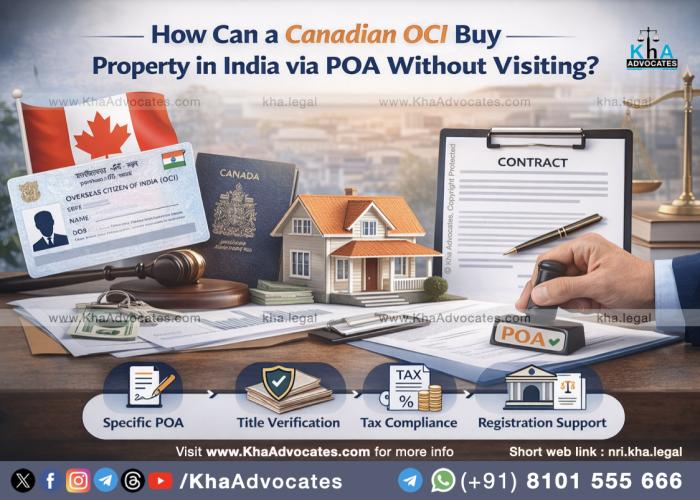
For Canadians holding an Overseas Citizen of India (OCI) card who want to invest in Indian real estate without physically travelling to India, the question is common:👉 Can you buy property through a Power of Attorney (POA)?👉 What is the exact lawful process?👉 What are the required documents, legal risks, and government rules?This guide answers these questions in simple language — but with professional legal precision — so you and your family can make informed, compliant investment decisions in Indian property law.Can an OCI Card Holder Buy Property in India Without Coming to India?Yes — Generally, YesAs per Indian law under the Foreign Exchange Management Act (FEMA) and its Rules (especially Foreign Exchange Management (Non-Debt Instruments) Rules, 2019), an OCI card holder is legally allowed to:✅ Purchase residential & commercial property in India❌ Except agricultural land, plantation property, or farmhouses (unless inherited) Under FEMA Section 5 & Section 46, OCIs enjoy general permission to acquire immovable property without prior approval of the Reserve Bank of India (RBI), provided all payments are made through permissible banking channels. 📌 Important Legal Foundation📜 1. FEMA 1999 & Non-Debt Instruments RulesContains the core rules on foreign acquisition and transfer of immovable property.OCIs fall under the permitted class (similar to Non-Resident Indians (NRIs)).Purchase of residential or commercial property requires no RBI approval; agricultural-related property does. 📜 2. Transfer of Property Act, 1882Governs how property rights can be transferred through sale deeds, wills, or POA.Under Section 5 & Section 54 (Definitions) it recognises valid conveyance through registered instruments. 📜 3. Indian Registration Act, 1908All instruments dealing with immovable property (including sale deeds and POA) must be registered at the local Sub-Registrar’s office for legal effect.Notarised but unregistered POA is legally ineffective as a transfer instrument. Can a POA Be Used to Buy Property Without Physical Presence?Yes — But Only If Done Correctly.A Power of Attorney allows your appointed representative in India to act on your behalf for specific property dealings including:➡ Identifying property➡ Negotiating price➡ Signing the sale agreement➡ Executing the sale deed➡ Attending registration formalitiesBut there are legal requirements:1️⃣ Special/Specific Power of Attorney (SPA)a. Must be carefully drafted to clearly list powers — e.g., negotiation, signing agreements, registration, tax payments.b. A general POA is insufficient for property purchase. 2️⃣ Attestation/ApostilleIf executed outside India, the POA must be:a. Notarised in Canada (or local state)b. Then either:✔ Apostilled (if Canada is Hague member), or✔ Attested by the Indian Consulate/EmbassyThis ensures Indian authorities accept it as authentic. 3️⃣ Registration in IndiaThe POA must be:📍 Registered with the Sub-Registrar Office where the property is located📍 Paid applicable stamp duty (state-specific)Note: A notarised POA alone — without registration — is not legally effective to deal with property. 🧭 Step-by-Step Process to Buy Property via POA (Canadian OCI)This process helps you purchase legally and securely without traveling:🔎 Step 1: Identify the Propertya. Confirm seller’s titleb. Conduct title and encumbrance searchc. Ensure no litigation or fraud history‼ This is where legal due diligence done by an expert law firm like KHA Advocates protects you.🖋️ Step 2: Draft and Execute Power of AttorneyYour Canadian OCI must:✔ Choose the attorney (trustworthy person in India)✔ Draft a specific SPA✔ Notarise it in Canada (state)✔ Apostille/Consulate attestation✔ Ship properly sealed to India✔ Get it registered locally with stamp duty paid📌 POA must be time-bound, specific & covers registration authority.💸 Step 3: Arrange FEMA-Compliant PaymentPayment for property must follow FEMA guidelines:✅ Through inward remittanceOR✅ From your NRE, NRO, or FCNR(B) account❌ Cash/Foreign currency notes/Traveler’s cheques NOT ALLOWED. 📄 Step 4: Sale Agreement & RegistrationYour attorney will:1. Sign the Agreement to Sell2. Pay earnest deposit3. Prepare the Sale Deed4. Pay stamp duty & registration fees5. Register the sale deed at Sub-Registrar’s OfficeOnly a registered Sale Deed transfers ownership. — POA itself does not transfer rights legally. 🧾 Step 5: PAN & Tax ComplianceOCI must hold:✔ Indian PAN Card (Income Tax purpose)✔ Comply with TDS requirements (if applicable)✔ File Income Tax return if rental income earnedPAN is essential for registration and taxation. 🏦 Step 6: Repatriation of Sale Proceeds (Future)If the OCI sells later and wants to bring money abroad:✔ Repatriation of sale proceeds is allowed subject to RBI rules and compliance with FEMA and tax laws.📌 Common Legal Pitfalls to Avoid❌ Using a Notarised POA only without registration❌ Ambiguous or blank powers❌ POA not consulate-attested or apostilled❌ Missing PAN or TDS compliance❌ Paying outside permissible channelsYes — a Canadian OCI card holder can legally buy residential or commercial property in India without coming to the country, provided all legal formalities are followed, especially through a registered Power of Attorney and FEMA-compliant payment methods.This method is entirely lawful and widely used, but depends heavily on:✔ Properly drafted, attested & registered POA✔ Clear title & due diligence✔ RBI/FEMA compliance✔ Local Registration complianceWhy Choose KHA Advocates?We specialize in:✔ OCI & NRI Property Transactions✔ Power of Attorney Drafting & Registration✔ FEMA & RBI Compliance✔ Property Title Verification✔ Sale Deed Registration Support✔ Cross-Border Real Estate AdvisoryWe assist clients globally — including Canada, USA, UK, Australia & Middle East.Contact Details :KHA Advocates [Law Firm]Google Location : https://share.google/oFGKBu7PpPPNJalp0 New Town, Hatiara, Dhankal, Noapara, Kolkata, West Bengal 700157📞 Phone: +91-94-777-5-888-5📱 WhatsApp: +91-8010-555-666📧 Email: contact@khaadvocates.in🌐 Website: https://www.khaadvocates.com 🗓 Book Consultation: 👉 https://khaadvocates.com/book-consultation
Read More
Buying or selling a property is one of the biggest financial transactions of life. Yet, many people rush into it without proper legal guidance—only to face disputes, fraud, or loss later. The sale agreement and the sale deed are the backbone of any property transaction. Any mistake in these documents can cost you money, peace of mind, or even the property itself.That’s where a property lawyer plays a critical role. In this blog, we explain why you need a property lawyer for drafting and verifying your sale agreement and sale deed, the risks of not having one, relevant case laws, and how our law firm can help you.Why Are Sale Agreement and Sale Deed So Important?Sale Agreement: This is the preliminary contract that records the terms and conditions agreed upon between the buyer and the seller—price, payment schedule, possession date, default clauses, etc. It sets the foundation for the final sale deed.Sale Deed: This is the final registered document that transfers ownership of the property from the seller to the buyer. It is executed only after all obligations of the sale agreement are fulfilled.💡 Key Point: If the sale deed is not properly drafted and registered, your ownership rights are not legally secure.Common Problems People Face Without a Property LawyerHidden Liabilities – Many properties have unpaid loans, tax dues, or legal disputes. Buyers discover them only after purchase.Defective Titles – If the seller is not the real owner or if the property has multiple claimants, the sale deed can be challenged in court.Unclear Clauses – Vague language in the sale agreement can lead to disputes over possession, payment, or construction delays.Fraudulent Sales – Cases of fake documents, forged signatures, and double sales are common.Registration Issues – Errors in stamp duty, witness details, or registration can render the deed invalid.👉 Solution: A property lawyer conducts thorough due diligence, drafts foolproof agreements, and ensures your rights are protected.Role of a Property Lawyer in Drafting a Sale AgreementTitle Verification – Ensures that the seller has a clear, marketable title to the property.Encumbrance Check – Verifies whether the property is free from loans, mortgages, or litigation.Custom Drafting – Tailors clauses to protect the buyer’s or seller’s interest (payment schedule, penalty clauses, force majeure, etc.).Compliance with Law – Ensures the agreement follows provisions under the Indian Contract Act, 1872, Transfer of Property Act, 1882, and RERA (for under-construction projects).Safeguard Against Defaults – Drafts clear remedies if either party defaults.Role of a Property Lawyer in Drafting & Verifying a Sale DeedDrafting Ownership Transfer Clauses – Ensures that the rights, title, and interest are properly transferred.Stamp Duty & Registration – Calculates exact stamp duty and ensures proper registration under the Registration Act, 1908.Verification of Property Details – Correct description of property (survey no., boundaries, area, municipal records).Witness & Execution Formalities – Ensures that execution is legally valid with witnesses and signatures.Avoiding Future Disputes – Drafts clear indemnity and possession clauses to prevent litigation.Case Laws Highlighting Importance of Proper Sale DeedsSuraj Lamp & Industries Pvt. Ltd. v. State of Haryana (2011) 14 SCC 729The Supreme Court held that property transfer can only be done by a registered sale deed, not by GPA or agreement alone.Hardev Singh v. Gurmail Singh (2007) 2 SCC 404Court clarified that mere possession under an agreement does not give ownership rights; only a registered sale deed can.K.B. Saha & Sons Pvt. Ltd. v. Development Consultant Ltd. (2008) 8 SCC 564Highlighted that vague or incomplete clauses in property documents can cause disputes and litigation.💡 Takeaway: A poorly drafted or unregistered sale deed is a legal risk. Always use a property lawyer.How Property Lawyers Prevent FraudConducting a search in land records office for encumbrances.Checking mutation records and municipal approvals.Verifying RERA registration for under-construction projects.Scrutinizing previous chain of documents to ensure no breaks in ownership.Cross-checking with bank records if property is mortgaged.✨ Don’t risk your hard-earned money. Secure your property deal with KHA Advocates – experts in property law. From drafting to registration, we ensure a safe, transparent, and hassle-free property transaction.Frequently Asked Questions (FAQs)Q1: Can I buy property without a sale agreement?No. A sale agreement is essential to record terms before executing the final sale deed.Q2: Is notarization enough instead of registration?No. Only a registered sale deed under the Registration Act, 1908, gives you legal ownership.Q3: Can I draft my own sale deed?Technically yes, but it is risky. Property law is complex. Errors can lead to disputes or even cancellation of the sale.Q4: How much does a property lawyer charge for sale deed drafting?Charges vary depending on complexity, location, and property value. At KHA Advocates, we provide cost-effective, transparent legal services.Q5: What if the seller refuses to execute the sale deed after agreement?You can file a Suit for Specific Performance under the Specific Relief Act, 1963. A lawyer will represent you in court.Contact KHA Advocates — Your Property Law Partner📍 Office: KHA Advocates – Property & Real Estate Legal Services📞 Phone : (+91) 94-777-5-888-5📞 WhatsApp: (+91) 8101-555-666📧 Email: contact@khaadvocates.in🌐 Website: www.khaadvocates.com🔗 Quick Appointment Link: https://khaadvocates.com/book-consultation👉 Call us today to book a consultation with our expert property lawyers before signing your sale agreement or sale deed.
Read More
🔹 IntroductionBuying property in New Town, Kolkata is a dream for many. But property registration is not just paperwork — it’s a legal safeguard that determines whether your investment is truly secure. A single mistake can cost you ownership rights, money, and years in court battles.👉 This is why you need a Property Registration Lawyer — to make sure your purchase is legally valid, dispute-free, and future-proof.🔹 What is Property Registration?📖 Under the Registration Act, 1908, property transactions above ₹100 must be registered.📌 Registration = official proof of ownership.📌 Without registration = property has no legal value.In West Bengal, registration also requires compliance with the Stamp Act & Registration Rules.⚠️ Problems Buyers Face Without a Lawyer🚫 Fake/forged documents from sellers🚫 Property under litigation or mortgage🚫 Wrong calculation of stamp duty → penalties🚫 Poorly drafted Sale Deed favoring seller🚫 Encroachment & ownership disputes👉 Solution: Hire a lawyer for due diligence + drafting + registration.🔹 How a Property Registration Lawyer Helps YouA Property Registration Lawyer provides end-to-end support in:a) Title Verification & Due DiligenceChecking original ownership documents (deed, khatian, mutation, tax receipts).Ensuring the property is free from litigation, mortgage, or encumbrance.Searching records at the Sub-Registrar’s office.b) Drafting & Reviewing the Sale DeedCustomizing clauses to protect the buyer’s rights.Ensuring there is no vague language that may favor the seller.Including indemnity clauses against future disputes.c) Stamp Duty & RegistrationCorrectly calculating stamp duty and fees under West Bengal Stamp Act.Filing the necessary documents with the Sub-Registrar.d) Execution & HandoverEnsuring smooth registration before the registering officer.Obtaining the certified copy of the registered deed.Advising on mutation and municipal tax transfer post-registration.Let's Summarise for you ✅ Title Verification – checks deeds, khatian, mutation, encumbrances✅ Drafting Sale Deed – buyer-friendly clauses, indemnity terms✅ Stamp Duty & Fees – accurate calculation under WB law✅ Registration Process – smooth execution at Sub-Registrar’s office✅ Post-registration – mutation, tax transfer, possession⚖️ Case Laws You Must KnowSuraj Lamp & Industries v. State of Haryana (2011) – Only a registered deed transfers ownership.K.B. Saha & Sons v. Development Consultant Ltd. (2008) – Unregistered documents = no legal proof of ownership.👉 Moral: Without proper legal registration, you don’t own the property.🏙️ Why Special Care in New Town, Kolkata?Most properties in New Town are leasehold under HIDCO.⚠️ Risks:Government permission needed for transferLease restrictions applyWrong drafting = cancellation of allotment👉 Only a lawyer experienced in HIDCO leasehold rules can protect you.✅ How We Help at KHA Advocates🔹 Title search + due diligence🔹 Custom deed drafting🔹 Registration at Sub-Registrar’s office🔹 NRI buyer assistance via Power of Attorney🔹 Post-registration services (mutation, tax, possession)💡 We make property registration 100% safe, legal, and stress-free.❓ FAQsQ1: Is a lawyer mandatory for property registration?➡ No, but without one, you risk fraud & defective deeds.Q2: Can NRIs register without visiting India?➡ Yes, via Power of Attorney.Q3: How long does registration take?➡ 2–4 weeks depending on clearances.📞 Contact Us TodayDon’t risk your dream home or investment. Protect it with expert legal help.📲 Call: (+91) 94-777-5-888-5📲 WhatsApp: (+91) 8101-555-666📧 Email: contact@khaadvocates.in🌐 Website: www.khaadvocates.com🔗 Book Appointment: https://khaadvocates.com/book-consultationProperty registration is the foundation of ownership. In places like New Town, Kolkata, where leasehold rules make transactions tricky, hiring a Property Registration Lawyer ensures your investment is safe, legal, and hassle-free.👉 Choose smart. Choose legal security. Choose KHA Advocates.
Read More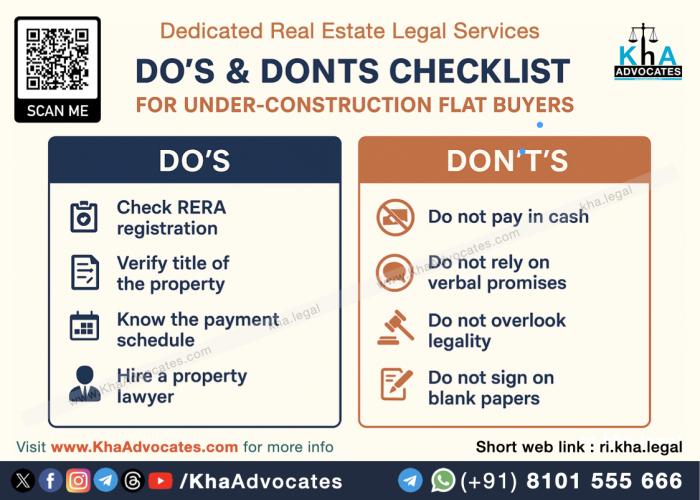
IntroductionBuying your dream home is one of the biggest financial and emotional decisions of life. Many buyers, especially first-time buyers, are drawn towards under-construction flats or apartments because they are often cheaper than ready-to-move-in properties and come with flexible payment options. However, under-construction properties also involve higher risks, such as project delays, legal disputes, or even fraud.As a buyer, knowing the legal process, safety measures, and essential do’s & don’ts can help you secure your investment and avoid unnecessary stress.At KHA Advocates, we assist property buyers with end-to-end legal support, from due diligence to registration, ensuring you buy your home with complete confidence.Step-by-Step Legal Process of Buying an Under-Construction Flat1. Check RERA RegistrationVisit your state’s RERA (Real Estate Regulatory Authority) portal.Verify whether the project is registered.Check the builder’s past projects, timelines, and compliance status.👉 Why it matters: Only RERA-approved projects provide legal safeguards for buyers.2. Verify Builder’s Title & ApprovalsConfirm the builder has clear ownership or development rights over the land.Check approvals from local authorities (municipality, fire, environmental clearance, etc.).👉 Why it matters: Buying from a builder without proper approvals can lead to cancellation of the project.3. Examine the Builder-Buyer AgreementCarefully review clauses on possession date, construction linked payments, cancellation, and refund policies.Look for hidden charges (maintenance, parking, club membership, etc.).👉 Why it matters: This agreement defines your rights – a lawyer can help negotiate unfavorable terms.4. Payment & Home Loan ProcedurePayments should follow the construction-linked plan and not exceed 10% before agreement registration (as per RERA).For home loans, banks conduct their due diligence – but don’t rely solely on bank approvals.5. Registration of Agreement for SaleLegally register your agreement at the Sub-Registrar’s office.Pay applicable stamp duty & registration charges.6. Possession & Occupancy CertificateBefore possession, check for Occupancy Certificate (OC) and Completion Certificate (CC).Without these, the property is legally incomplete.Safety Measures Before Booking an Under-Construction Flat✅ Check Builder’s Reputation – Past delays, litigation, financial standing.✅ Verify Carpet Area – RERA mandates selling on carpet area, not super built-up.✅ Escrow Account Compliance – Ensure builder deposits 70% of buyer’s funds in RERA account.✅ Timely Updates – RERA requires builders to provide construction progress updates online.✅ Legal Scrutiny of All Documents – Hire a property lawyer to verify every paper.Do’s & Don’ts List for Buyers✅ Do’s:Do verify the project’s RERA registration.Do conduct a legal title check of the land.Do hire a real estate lawyer for document vetting.Do keep all receipts, agreements, and builder communication in writing.Do check for hidden charges like GST, maintenance, parking.❌ Don’ts:Don’t rely solely on the builder’s brochure or promises.Don’t pay more than 10% of the cost before agreement registration.Don’t skip checking OC & CC before taking possession.Don’t ignore the fine print in the builder-buyer agreement.Don’t book based only on verbal assurances or flashy advertisements.Case Study: Buyers Saved by Legal Due DiligenceA group of buyers in Kolkata booked flats in an under-construction project that was heavily advertised. Our team at KHA Advocates was approached for due diligence. Upon inspection, we found that:The land title had a pending litigation.The builder had failed to secure environmental clearance.By acting early, the buyers avoided investing in a risky project and redirected their funds into a RERA-compliant development.👉 Lesson: A small investment in legal checks can save you from losing your life savings.Why You Need a Real Estate Lawyer for Under-Construction PropertiesContract Protection – Lawyers help negotiate builder-buyer agreements to protect your interests.Fraud Prevention – Prevents scams by verifying builder credentials and land titles.Compliance Checks – Ensures approvals and sanctions are in place.Dispute Resolution – Quick legal recourse in case of delays or defaults.Peace of Mind – Focus on your dream home while your lawyer safeguards your investment.ConclusionBuying an under-construction flat can be rewarding, but it comes with risks that only expert legal guidance can minimize. Don’t let hidden clauses, delayed possession, or fraud turn your dream home into a nightmare.At KHA Advocates, we specialize in property law and real estate legal services. From document verification to dispute resolution, we ensure that your home-buying journey is secure, transparent, and stress-free.👉 Build your dream home with confidence – Partner with KHA Advocates today!📞 Contact Us: +91-9477758885📧 Email: contact@khaadvocates.in📍 Location: New Town, Near CC2, Kolkata, West Bengal, India🌐 Visit: www.khaadvocates.com
Read More
IntroductionThe real estate industry is one of the most lucrative yet legally complex sectors in India. Every deal—whether it’s the purchase of land, the sale of flats, or large-scale township development—comes with a web of contracts, regulatory approvals, and compliance obligations. For real estate agents and developers, success is not just about finding the right buyer or executing a project; it’s about ensuring that every step is legally secure.This is why having an expert real estate lawyer on your side is no longer optional—it is a necessity. At KHA Advocates, we specialize in providing end-to-end legal solutions to real estate agents, developers, and investors, ensuring smooth transactions, risk mitigation, and faster deal closures.Why Real Estate Lawyers Are Indispensable1. Property Title Verification & Due DiligenceBefore finalizing any property deal, it is crucial to verify ownership and legal status.Our lawyers conduct title searches, encumbrance checks, mutation record verification, and litigation status checks.This ensures that developers and agents never risk selling or promoting disputed properties.2. Drafting & Reviewing AgreementsReal estate transactions involve Agreements to Sell, Sale Deeds, Development Agreements, Lease Deeds, RERA-compliant builder-buyer agreements, and Joint Venture Contracts.A minor error in drafting can lead to years of litigation or financial loss.Our expert lawyers ensure every clause safeguards your interest, prevents disputes, and complies with Indian property law.3. RERA Compliance & Regulatory ApprovalsWith the introduction of RERA (Real Estate Regulatory Authority), developers must comply with stringent guidelines before advertising or selling projects.We assist in RERA registration, quarterly compliance, buyer dispute defense, and regulatory filings.Real estate agents and developers who work with us avoid penalties, project delays, and reputational risks.4. Dispute Resolution & Litigation SupportProperty disputes are common—ranging from delayed possession claims, land acquisition disputes, buyer complaints, or contractual disagreements.Our legal team represents clients before RERA, Consumer Courts, Civil Courts, High Courts, and Arbitration Tribunals.Having a strong legal partner ensures disputes are handled strategically and quickly, protecting your brand reputation.5. Taxation & Financial StructuringReal estate transactions are heavily taxed through stamp duty, GST, TDS, and capital gains tax.Our lawyers collaborate with tax experts to structure deals in the most tax-efficient way, ensuring compliance while maximizing profits.6. Joint Ventures & Builder CollaborationsMany developers enter into Joint Development Agreements (JDAs) with landowners.Without proper legal safeguards, developers risk losing control or profits.Our team ensures fair drafting, profit-sharing clarity, exit clauses, and dispute resolution mechanisms in such collaborations.7. Faster Deal Closures with Legal BackupA property deal backed by a reputed law firm builds trust among buyers, investors, and financial institutions.When buyers see that all documents are vetted by KHA Advocates, confidence increases, leading to quicker sales and project funding.Why Real Estate Agents & Developers Prefer KHA Advocates✅ End-to-End Support – From due diligence to litigation defense.✅ RERA Specialists – Complete compliance support.✅ Deal Structuring Experts – Tax-efficient, legally sound transactions.✅ Strong Dispute Defense – Representation across courts and tribunals.✅ Trusted by Investors & Homebuyers – Our legal certification enhances credibility.Example Case StudyA leading developer in Kolkata faced a buyer dispute over delayed possession. The case went to RERA, where the buyer demanded refund with interest. By strategically defending the matter, KHA Advocates helped the developer avoid a ₹2 crore liability and negotiated an amicable settlement, saving both reputation and money.ConclusionIn today’s competitive real estate market, having an expert real estate lawyer is not a luxury—it’s a business strategy. From compliance to dispute resolution, lawyers ensure that every deal is legally sound, every agreement is enforceable, and every project runs without costly interruptions.At KHA Advocates, we pride ourselves on being the legal backbone for real estate agents and developers, empowering them to focus on growth while we safeguard their legal interests.Let's Connect with an Expert👉 Are you a real estate agent or developer looking for a trusted legal partner?👉 Do you want hassle-free deal closures, RERA compliance, and dispute protection?📞 Contact KHA Advocates today and let our expert real estate lawyers secure your deals.
Read More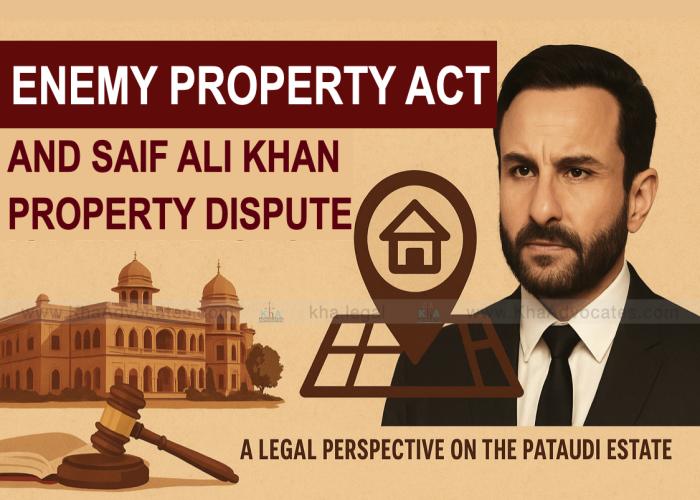
IntroductionThe Enemy Property Act, 1968 has often been in the news due to high-profile property disputes. One of the most talked-about cases involves Bollywood actor Saif Ali Khan and the prestigious Pataudi Estate. While many see this as a family inheritance matter, legally it is much more complicated, as the Enemy Property Act directly governs whether heirs like Saif can claim ownership of certain ancestral assets.This blog explores the legal perspective on the Enemy Property Act, its relevance to the Pataudi Estate dispute, and how it impacted Saif Ali Khan’s inheritance rights.What is the Enemy Property Act?The Enemy Property Act, 1968 was enacted by the Government of India after the Indo-Pak wars of 1965 and 1971. It essentially deals with properties left behind in India by people who migrated to Pakistan or China during these wars.Such properties were taken over by the Custodian of Enemy Property for India.Heirs of those who migrated were barred from claiming ownership rights.Even Indian citizens related to the “enemy” were restricted from succession to such properties.The law was strengthened further in 2017 through an amendment, making it clear that no heir of an enemy can inherit such property, even if they are Indian citizens.The Pataudi Estate Dispute – BackgroundThe Pataudi family, a prominent royal household in Haryana, traces its lineage back to Nawab Iftikhar Ali Khan and later Nawab Mansoor Ali Khan Pataudi. The estate included prime landholdings, palaces, and ancestral properties.The controversy began when it was argued that certain portions of the Pataudi Estate fell within the ambit of the Enemy Property Act due to the migration of some family members to Pakistan.This created legal hurdles in the inheritance of Saif Ali Khan, son of Mansoor Ali Khan Pataudi and Sharmila Tagore, despite him being an Indian citizen and legal heir.How the Enemy Property Act Affected the Pataudi Estate The legal complications arose because: • Some of Saif Ali Khan’s relatives, including family members connected to Bhopal and Hyderabad princely states, had migrated to Pakistan. • Under the Enemy Property Act, properties belonging to those relatives were considered enemy property. • This meant that even Indian-born heirs like Saif Ali Khan could not automatically inherit certain ancestral properties. Thus, while Saif was declared the legal heir to parts of the Pataudi Estate, the Enemy Property Act restricted his rights over portions of the ancestral property. How Did This Affect Saif Ali Khan? The direct impact of the Enemy Property Act on Saif Ali Khan was significant: 1. Inheritance Restriction – Saif could not freely inherit all properties linked to his ancestors because the law prohibited transfer of enemy property to heirs. 2. Legal Disputes & Delays – The Pataudi family faced litigation and government intervention, leading to a prolonged battle to establish ownership rights. 3. Loss of Royal Assets – Despite being the legal heir, Saif’s rights over parts of the estate were curtailed, preventing him from exercising full control. 4. Symbolic Loss of Heritage – For Saif, the dispute was not only about property value but also about ancestral pride and royal legacy. This demonstrates how even celebrity heirs are not immune to the far-reaching consequences of the Enemy Property ActLegal Perspective on the CaseFrom a legal standpoint, the dispute highlights several critical issues:Conflict between Succession Laws & Enemy Property ActNormally, under the Hindu Succession Act or personal laws, a son inherits his father’s property.However, the Enemy Property Act overrides succession rights, making heirs powerless if the property is classified as enemy property.Doctrine of Public PolicyThe Act is based on national interest, preventing properties linked to “enemies” from being exploited.But, in practice, it often impacts Indian citizens like Saif Ali Khan, raising concerns of fairness.Judicial InterpretationsIndian courts have consistently upheld the supremacy of the Act, limiting the scope of inheritance claims.This shows how special laws override general inheritance provisions.Lessons for Property Owners and HeirsThe Pataudi Estate dispute serves as a cautionary tale for families dealing with ancestral properties. Key lessons include:Title Verification is Crucial – Before claiming or buying any property, ensure it is not under the Enemy Property Act or other restrictions.Legal Documentation Matters – Proper succession deeds, wills, and title clearances can reduce future disputes.Seek Legal Expertise Early – Corporate lawyers and property law experts can prevent disputes from escalating into decades-long battles.NRI Families Must Be Extra Careful – Many NRIs unknowingly inherit properties linked to enemy properties, exposing them to long litigation.How Our Law Firm Can HelpAt KHA Advocates, we specialize in:Property Title Verification – Ensuring properties are free from legal encumbrances before purchase or transfer.Inheritance & Succession Advisory – Drafting wills, succession certificates, and family settlements to secure property rights.Dispute Resolution & Litigation Support – Representing clients in property disputes, including those under special laws like the Enemy Property Act.NRI Property Services – Helping NRIs manage, protect, and transfer their properties in India.If you’re facing property disputes or inheritance complications, our expert property lawyers can safeguard your rights.ConclusionThe Enemy Property Act was designed to protect national interests but has had profound implications on individual inheritance rights. The Saif Ali Khan Pataudi Estate dispute is a high-profile example of how this law can prevent rightful heirs from accessing ancestral property.For business owners, heirs, and NRIs, the key takeaway is clear: always seek legal due diligence and expert advice before claiming, buying, or transferring property👉 If you need guidance on property disputes, connect with KHA Advocates today and protect your rights before it’s too late.
Read More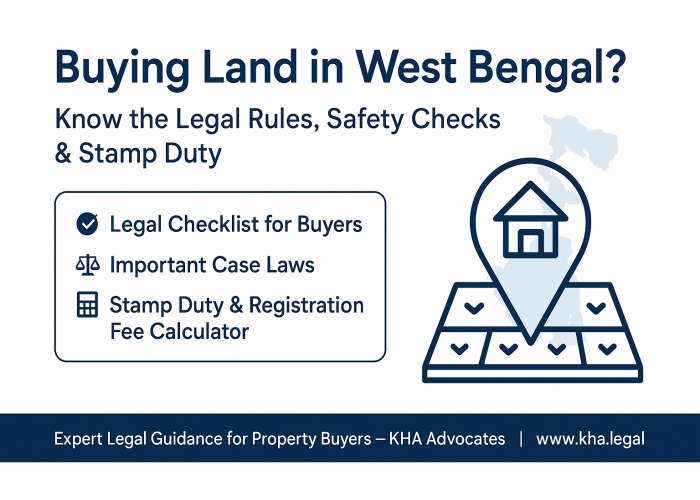
Buying land in West Bengal can be rewarding—but only if you get the legal basics right. This guide walks you through due-diligence steps, must-know rules under Bengal laws, and the current stamp duty & registration charges, with quick examples, case-law checkpoints, and a simple checklist you can use before you sign.1) Start with a Clean Title: What to Verifya) Chain of Title (minimum 30 years).Collect all prior deeds (sale, gift, partition, exchange) and compare RS/LR Dag & Khatian numbers, Mouza, and area across documents.Ensure there are no gaps in the chain and that every transferor actually had the right to sell.b) Encumbrance Check.Obtain an Encumbrance Certificate and search the Sub-Registrar’s records for mortgages, lis pendens, attachments, court orders, or ongoing disputes.c) Mutation vs. Ownership.Mutation (name change in Record-of-Rights/Porcha) is important for tax and utilities but it doesn’t prove ownership. Courts repeatedly hold that mutation entries are only for fiscal purposes and don’t create or extinguish title. d) Land Use & Conversion (Agricultural to Non-Agricultural).For agricultural plots, check conversion permissions (where applicable) and land-use restrictions before development.Verify local plans, zoning, road-widening reservations, waterbodies, thika land issues, coastal or forest restrictions, etc.e) Possession & Boundaries.Conduct a site survey with a licensed surveyor; match ground boundaries with revenue maps and deeds.Confirm access/right of way is legal and undisputed.f) Special Estates & Leaseholds.In areas like Bidhannagar (Salt Lake) and some industrial estates, you’re often buying leasehold rights with transfer conditions and authority permissions. Review allotment letters, lease deeds, and transfer policies carefully.Case-law guardrail: The Supreme Court in Suraj Lamp & Industries v. State of Haryana (2011) held that GPA/Agreement-to-Sell/Will (“SA/GPA/Will”) transactions do not convey title; only a registered conveyance deed transfers ownership of immovable property. Don’t rely on “GPA sales.” 2) Agreements & Documents You’ll Typically NeedTitle Verification Report (by your lawyer, post record and site checks)Agreement for Sale (with detailed reps/warranties; attach a schedule and accurate site plan)No-objection certificates/permissions (as applicable—ULC/ceiling compliance history, conversion NOC, municipal/revenue clearances, society/lessor consent)Registered Sale Deed at the jurisdictional Sub-Registrar office (mandatory to pass title). Recent Supreme Court guidance re-affirms that documents requiring registration are inadmissible to convey title if unregistered. 3) Stamp Duty & Registration Charges in West Bengal (2025)Use Stamp Duty Calculator developed by KhA AdvocatesImportant policy updates:West Bengal withdrew the temporary 2% stamp duty rebate and 10% circle-rate reduction from July 1, 2024 (initially introduced in Oct 2021). Always budget at full rates now. From January 17, 2024, the State announced stamp duty assessment on carpet area, not super built-up area (and simultaneously revised circle rates). Expect operational nuances while authorities refine forms. How to estimate online: Use the MV/SD/RF Calculator on the West Bengal Registration portal (select “Stamp Duty & Registration Fee”). 4) Bengal-Specific Pitfalls (and how to avoid them)Ceiling & Tenancy footprints: Trace historic land ceiling proceedings/regularizations and tenancy (bargadar) claims.Waterbodies/Khaitan descriptors: If the RoR shows doba, pukur, khal etc., special restrictions may apply; converting and filling may be prohibited without permissions.Thika & Khas Mahal land: Extra layers of consent/eligibility can apply—get a targeted legal opinion.Leasehold in planned townships: Check transfer charges, lessor’s prior consent, and lock-in conditions.Set-offs and approach roads: Verify right of way is recorded; don’t assume a neighbor’s path is public.“GPA sale” or “Notary deed” shortcuts: Avoid—no title passes without a registered conveyance. 5) Micro-Checklist Before You Pay Token Money✅ Title search (30 years) with encumbrance & litigation scan✅ RoR/Porcha & mutation status matched to deeds (knowing mutation ≠ title) ✅ Site survey & boundary match (with LR/RS maps)✅ Land use & conversion permissions verified✅ Utility dues & property tax updated; indemnities for past dues✅ No pending acquisition/road widening reservations✅ Drafting of robust Agreement for Sale (clear reps/warranties, indemnities, timelines, default & refund clauses)✅ Final deed: register at proper SRO; pay stamp duty + 1% registration via GRIPS/IGR portals; collect e-challans & final registered copy. 6) Case-Law Corner (What it means for you)Mutation ≠ Ownership. Courts consistently reiterate that mutation is fiscal/administrative and does not confer title—use it to update records and pay taxes, not as proof of ownership. Only a Registered Conveyance Passes Title. The Supreme Court in Suraj Lamp (2011) held SA/GPA/Willpathways do not transfer ownership. Insist on a registered sale deed. Recent Supreme Court orders continue to underscore Sections 17 & 49 of the Registration Act, 1908—unregistered documents that require registration are inadmissible to convey title. 7) FAQsQ1. What are the current stamp duty and registration rates in West Bengal?A. Registration fee is 1%. Stamp duty varies by location and value slab (e.g., rural 3–4%, urban 4–5% generally; Kolkata/Howrah slabs often reflect 6–7% bands). Use the IGR calculator for your exact local body and property value. Q2. Is the 2% stamp duty rebate still available?A. No. It ended June 30, 2024; normal rates apply from July 1, 2024. Q3. Is stamp duty based on carpet area or super built-up?A. The State announced assessment on carpet area (with other adjustments like circle-rate revisions). Expect implementation nuances; always check the latest form and local SRO practice. Q4. Can I buy through GPA/ATS to save time or cost?A. Avoid. No title passes without a registered conveyance. Q5. Do women or senior citizens get a concession in Bengal?A. Unlike some states, no general gender-based concession is provided; check if any time-bound schemes are notified. Use the IGR calculator for the precise figure. 8) How KHA ADVOCATES Helps You Close Safely (and Save Money)Title & Litigation Deep-Dive: We run a 30-year title audit, encumbrance search, and suit/attachment scan so you don’t inherit hidden risks.Structuring & Tax-smart Drafting: From Agreement for Sale to Sale Deed, we build iron-clad clauses(indemnities, default matrix, delayed possession compensation, price-protection) and align TDS, GST (ifany) and stamp duty planning to avoid penalties.Regulatory Navigation: Conversion, lessor/society permissions, RERA alignment, and municipal compliances—done end-to-end.Registration Day Concierge: Slot booking, GRIPS/IGR e-payments, document checks, witness coordination, and smooth execution at the SRO.'After-care: Mutation applications, tax meter shift, and record updates so your ownership reflects everywhere that matters.Free 15-minute Consultation: Planning to buy land in Kolkata, Howrah, Salt Lake, Siliguri, Durgapur or across Bengal? Book a call with KHA ADVOCATES to get a quick duty estimate + red-flag review of the property before you commit.9) Final TakeawaysDon’t rely on mutation as ownership proof; rely on clear title + registered deed. Budget stamp duty + 1% registration at post-rebate rates (effective July 1, 2024). Use the official calculator for exact numbers by local body and value, and get documents vetted before you pay token money. Need a precise stamp duty & fee calculation for your plot—and a same-day document red-flag review?Message KHA ADVOCATES now. One guided call can save you lakhs and months of stress.
Read More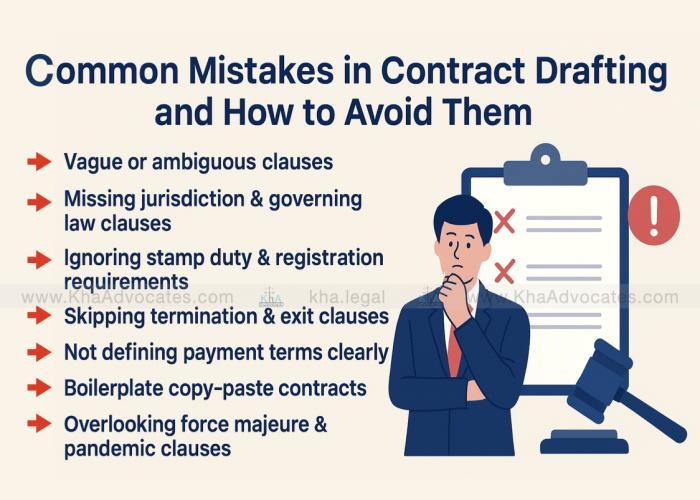
IntroductionContracts are the backbone of every business relationship. Whether you’re a startup signing your first vendor agreement or a corporation negotiating a multi-crore deal, a poorly drafted contract can lead to disputes, losses, and even litigation. In India, contract drafting is governed primarily by the Indian Contract Act, 1872, along with provisions of the Indian Stamp Act, 1899, and relevant judgments by the Supreme Court and High Courts.In this blog, we’ll explore the most common mistakes made during contract drafting, legal consequences, landmark judgments, and practical tips on how to avoid them.1. Vague or Ambiguous ClausesMistake: Using unclear terms such as “reasonable time,” “best efforts,” or “mutual understanding.”Consequence: Leads to multiple interpretations and disputes.Case Law: ONGC v. Saw Pipes Ltd. (2003) – The Supreme Court held that vague clauses can render contracts unenforceable if they lack certainty.Solution: Always use precise, measurable language. For example, instead of “deliver goods on time,” specify “deliver 500 units within 30 days.”2. Missing Jurisdiction & Governing Law ClausesMistake: Failing to specify which court or state laws will govern disputes.Consequence: Parties may file cases in multiple jurisdictions, leading to unnecessary litigation.Case Law: Swastik Gases Pvt. Ltd. v. Indian Oil Corporation Ltd. (2013) – The Supreme Court emphasized the importance of jurisdiction clauses.Solution: Insert a clear clause like: “This Agreement shall be governed by the laws of India, and courts at Kolkata shall have exclusive jurisdiction.”3. Ignoring Stamp Duty & Registration RequirementsMistake: Contracts like leases, partnerships, or property agreements often remain unstamped or unregistered.Consequence: Courts may refuse to admit such documents as evidence.Law: Indian Stamp Act, 1899 and Registration Act, 1908.Example: An unstamped lease deed exceeding 12 months can be declared invalid.Solution: Always calculate proper stamp duty and register agreements wherever required.4. Skipping Termination & Exit ClausesMistake: Not defining conditions for termination or exit of parties.Consequence: Leads to endless disputes when parties want to exit.Case Law: Tata Consultancy Services Ltd. v. Cyrus Investments Pvt. Ltd. (2021) – The importance of clear exit clauses in shareholder agreements was highlighted.Solution: Define termination events (breach, insolvency, force majeure) and lay down notice periods, penalties, and handover procedures.5. Not Defining Payment Terms ClearlyMistake: Contracts state “payment shall be made promptly” without defining mode, due date, or late fee.Consequence: Disputes over payment delays and penalties.Law: Indian Contract Act, 1872 (Section 73 – Compensation for Breach of Contract).Solution: Specify “Payment of ₹10,00,000 shall be made via bank transfer within 15 days of invoice, with 12% interest applicable on delays.”6. Boilerplate Copy-Paste Contracts Mistake: Using internet templates without customization.Consequence: Many clauses may be irrelevant, illegal, or contradictory.Case Study: A startup copied an NDA template online, which did not comply with Indian law. During litigation, the court rejected parts of the NDA.Solution: Always customize contracts based on Indian law, industry, and party requirements.7. Overlooking Force Majeure & Pandemic ClausesMistake: Not including provisions for unforeseen events like pandemics, wars, or natural disasters.Case Law: Halliburton Offshore Services v. Vedanta Ltd. (2020, Delhi HC) – The court recognized COVID-19 as a force majeure event.Solution: Define force majeure events, notification timelines, and consequences (suspension or termination).Practical Tips for Safe Contract DraftingHire a Lawyer: Professional vetting prevents loopholes.Review Twice: Both parties should review drafts carefully.Update Regularly: Revise old contracts to include latest laws and judgments.Use Clear Language: Avoid jargon, keep it simple.FAQs on Contract DraftingQ1. Is an oral contract valid in India?Yes, oral contracts are valid under the Indian Contract Act, 1872, but difficult to prove in court. Always prefer written contracts.Q2. What makes a contract legally enforceable in India?Offer, acceptance, lawful consideration, free consent, lawful object, and capacity of parties.Q3. Can a contract be on plain paper without stamp duty?Yes, it’s valid but may not be admissible in court without proper stamping.Q4. What happens if a contract has a missing clause?Courts may interpret it against the drafter, leading to unfavorable judgments.Q5. How can startups ensure safe contract drafting?By consulting a corporate lawyer to draft customized agreements like Founders’ Agreement, Shareholders’ Agreement, and Employment Contracts.Q6. Do contracts need witnesses?Not always. Only certain agreements like property deeds, wills, or surety bonds need attestation.Q7. Can e-contracts and digital signatures be used in India?Yes, under the Information Technology Act, 2000, e-signatures and e-contracts are legally valid.At KHA Advocates, we specialize in contract drafting, vetting, and negotiation for startups, corporates, and individuals. Our expert lawyers ensure your agreements are legally enforceable, customized to your needs, and dispute-proof.👉 Avoid costly litigation – Book a consultation with KHA Advocates today!
Read More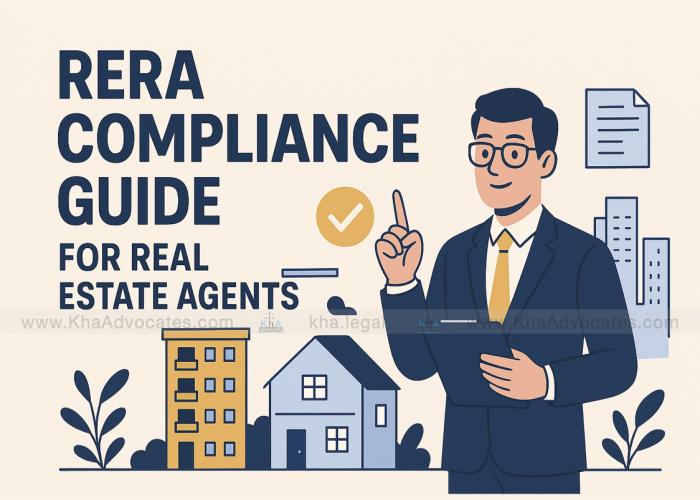
Introduction: Why RERA Matters for New AgentsIf you’re a real estate agent with less than three years of experience, you’ve probably heard the term RERA thrown around in conversations, training programs, and even client meetings. The Real Estate (Regulation and Development) Act, 2016 was introduced to bring transparency, accountability, and fairness to India’s real estate sector.For agents, RERA is not just a legal formality—it’s your license to operate, build trust, and close deals confidently. In fact, RERA compliance can be your biggest selling point when winning over clients.This guide will walk you through everything you need to know about RERA compliance, with practical tips, legal insights, and real-world advice tailored for agents like you.What is RERA and Why Should Agents Care?RERA was enacted to protect homebuyers and regulate the real estate industry. For agents, it:Makes registration mandatory to operate legally.Requires disclosure of property details before selling.Ensures ethical dealing with both buyers and developers.Failing to comply can result in hefty penalties or even being barred from business. On the flip side, RERA compliance can boost your credibility and help you close more sales.Step-by-Step RERA Compliance Checklist for Agents1. Register Yourself as a RERA AgentWhy? It’s the law. You cannot facilitate property sales without RERA registration.How? Visit your state’s RERA website, fill out the application form, upload required documents, and pay the registration fee.Tip: Always keep your registration number handy—it builds instant trust with clients.2. Understand Your State’s RERA RulesEach state has its own RERA authority and rules. For example, WBRERA in West Bengal, etc.Action Step: Bookmark your state’s RERA website and check for rule updates regularly.Benefit: Staying updated means you won’t accidentally violate new regulations.3. Work Only with Registered ProjectsSelling an unregistered project is a major violation. Always check the RERA project registration number before marketing or selling.Tip: Use the RERA portal to verify project details—buyers love agents who show them official proof.4. Disclose Accurate Information to ClientsUnder RERA, you must share all relevant details about a property—pricing, possession timelines, approvals, and amenities.Best Practice: Maintain a property fact sheet for every listing.5. Maintain Transaction RecordsRERA requires agents to keep proper records of transactions.Why? These can protect you in case of disputes.Pro Tip: Digitize your paperwork using cloud storage—it’s safer and faster to retrieve.6. Avoid Misleading AdvertisementsRule: Do not advertise unapproved layouts, amenities, or false possession dates.Example: If possession is 2027, don’t write “Ready in 2 Years” unless confirmed.7. Renew Your RERA Registration on TimeRERA registrations have an expiry date—usually 5 years, but it varies by state.Tip: Set calendar reminders for renewal at least 3 months in advance.8. Act as a Neutral FacilitatorRERA recognizes agents as intermediaries, not salespeople for one party.Ethics Tip: Always ensure fairness between the buyer and seller.9. Stay Updated with RERA AmendmentsThe law is evolving. Attend RERA workshops, webinars, or legal training to keep learning.Benefit: Your knowledge will set you apart from other new agents.10. Partner with a Legal MentorIf you’re new, navigating compliance can be overwhelming. Working with a law firm specializing in RERA can save you from costly mistakes and even speed up your deal closures.Common RERA Mistakes New Agents MakeSkipping registration to avoid fees.Not verifying projects before selling.Making verbal promises that can’t be kept.Ignoring renewal dates for registration.Not keeping proper documentation of transactions.Avoiding these mistakes will keep your record clean and your reputation strong.How RERA Compliance Helps You Win More ClientsBuilds trust – Buyers feel safer dealing with registered agents.Differentiates you – Many agents still operate without full compliance.Protects you legally – Compliance shields you from penalties and lawsuits.Boosts referrals – Happy, protected clients recommend you to others.FAQ – RERA for New Real Estate AgentsQ1. Do I need RERA registration if I only deal in rentals?A: No, RERA applies to property sales, not rentals. But check your state’s rules for exceptions.Q2. How much does RERA registration cost?A: Fees vary by state—usually between ₹25,000 for individuals.Q3. Can I operate in multiple states with one RERA license?A: No, you need separate registration for each state.Q4. What happens if I sell an unregistered project?A: You can face heavy fines or even imprisonment. Always verify before selling.Q5. How long does RERA registration take?A: Usually 15–30 days, depending on state processing times.Final Thoughts – Your Compliance is Your StrengthAs a new agent, it’s tempting to focus only on closing deals quickly, but in today’s regulated market, compliance is your competitive edge. Buyers and developers want to work with agents they can trust—and RERA compliance is proof of your professionalism.Don’t see RERA as a hurdle; see it as a business tool that helps you stand out in a crowded market.Let’s Build Your RERA-Ready CareerAt KHA Advocates, we act as your legal mentor—guiding you through RERA registration, project verification, agreement vetting, and compliance training.Whether you’re a new broker or a growing agency, our legal support ensures you operate 100% within the law while building a trustworthy brand.📞 Call us today at 9832-555-666 or 📧 email us at contact@khaadvocates.in to start your RERA-compliant journey.
Read More
Highly recommended for Divorce case. I got Divorce order so fast than my expectation. Thanks a lot Mr. Kabir
Shreyasi Chakrabarty